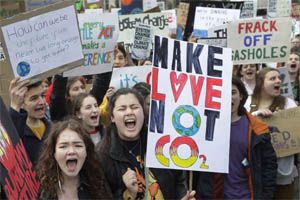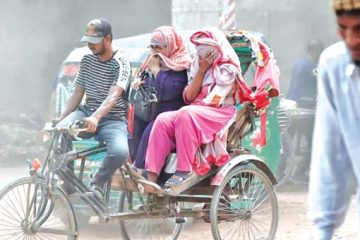Opinion
Saleemul Huq
 The global environmental movement started in 1972, with the first global environment conference held in Stockholm, Sweden, hosted by then Swedish Prime Minister Olof Palme. Among the heads of governments who also attended was the then Indian Prime Minister Indira Gandhi, who famously declared that environment and poverty were two major global issues that needed to be tackled together.
The global environmental movement started in 1972, with the first global environment conference held in Stockholm, Sweden, hosted by then Swedish Prime Minister Olof Palme. Among the heads of governments who also attended was the then Indian Prime Minister Indira Gandhi, who famously declared that environment and poverty were two major global issues that needed to be tackled together.
Since that watershed event, the United Nations set up the UN Environment Programme (UNEP), and different environmental treaties such as the UN Framework Convention on Climate Change (UNFCCC), UN Convention on Biological Diversity (UNCBD), and UN Convention to Combat Desertification (UNCCD) have been enforced, which are moving forward with their respective annual conferences of parties (COPs).
To commemorate the event, the Government of Sweden, together with the Government of Kenya and UNEP, held Stockholm+50 in Stockholm last week, with participants from around the world to take stock of the environmental movement and plan the next phase.
I had the privilege of attending the event, and will share some of my reflections on both the event and what needs to happen next.
The two-day event started with a high-level opening session, where the heads of governments of Sweden and Kenya as well as the UN secretary-general and the head of UNEP all spoke, followed by plenary sessions for ministers from many countries, including Bangladesh Foreign Minister AK Abdul Momen.
However, the most interesting sessions were the many side events where different groups such as scientists, women, youth, farmers, indigenous groups, businesses, and many others, were invited to share their work and views about the future.
The main theme of the overall conference was to reconnect the different strands of the original environmental movement, which has become divided over the last 50 years, as well as to galvanise actions at a faster pace involving all stakeholders, rather than just governments.
I had the opportunity to share my reflections at the concluding session of the conference and said the following While there is much to celebrate in terms of having raised global awareness of the importance of the environment over the last 50 years, as well as some progress on different aspects such as climate change, biodiversity and pollution control, the progress has been too little, too late, and hence we needed to change our approach going forward.
The first task is to stop relying on government leaders to come to global events once a year and make promises and then go home and fail to implement their own promises. This has clearly failed as a process. Hence, there is a need to have other global stakeholders involved in such meetings and in implementing the decisions once they are approved. This includes the private sector as well as civil society networks and groups.
The second new element that needs to happen is to make the youth more prominent in the decision-making process, and even the implementation, and not just in advocacy as they are now. Young people around the world have already
demonstrated their capabilities to take actions and support environmental causes locally as well as globally. I suggested that we turn the annual pre-COP of the UNFCCC into a Youth COP as well as an “Accountability COP” henceforth. This was in fact done quite successfully by Italy, who hosted the pre-COP26 in Milan last year before the main COP26 in Glasgow in November.
The upcoming pre-COP27 will be hosted by the Democratic Republic of the Congo (DRC) in Kinshasa prior to COP27 in Sharm el-Sheikh in Egypt this year. This could be an opportunity to make it into a youth COP again.
Finally, the biggest shift we need to achieve is in the consciousness of every person in the world, where they start to think of themselves as the citizens of Planet Earth first, before thinking of themselves as the citizens of their countries and cities. This means that each and every one of us need to do whatever we can as conscious citizens to preserve our environment, while also looking after our own development and well-being. This is possible to do, but will require a major paradigm shift in our thinking and commitment starting from the individual level upwards.
It is important that we solve these problems in the next 50 years, or the future will be unthinkable for our children and grandchildren in the coming decades.
Dr Saleemul Huq is director of the International Centre for Climate Change and Development (ICCCAD) at Independent University, Bangladesh (IUB).
– Article originally published on The Daily Star Image courtesy: Kirsty Wigglesworth / AP







